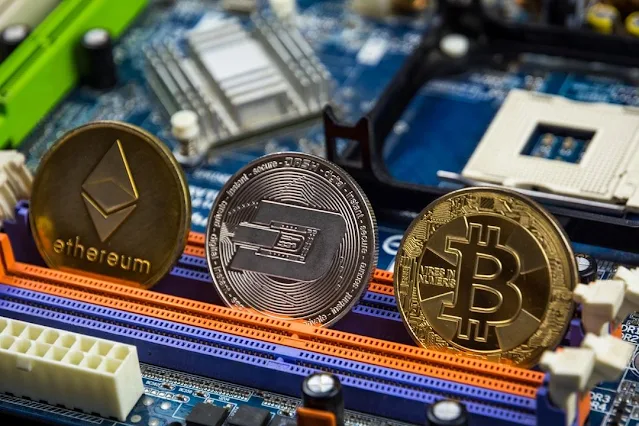Ad Code
Translate
Smart strategies for trading on crypto exchanges
October 20, 2025
Five Do’s For a Healthy Turnover That Bolsters Talent-Retention
October 20, 2025
Discover Honeybee Pharmacy (2025 Guide Important Consumer Tips)
October 14, 2025
What is Ozempic (semaglutide)? (Updated in 2025)
January 30, 2025
Posture Bra: Improving Back Support and Comfort
October 20, 2025
How To Find Suitable Properties In Cyprus?
October 20, 2025
10 Effective Strategies to Improve Domain Authority of Your Website
October 20, 2025
What Is a Decentralized Exchange?
Zizo Gala-Mkhize
October 20, 2025
When you're first introduced to cryptocurrency, there's a ton of information thrown your way that you need to learn more about in order to effectively manage your digital assets. However, one of the very first steps that you will be taking is signing up at an exchange to purchase crypto. While popular exchanges like Coinbase, Kraken, or Binance are often advertised as the best places to get started, the reality is that you have another option that may be better suited for your needs: a decentralized exchange. Let's take a closer look at this type of cryptocurrency exchange to better understand what it is, what it has to offer, and whether or not it's right for you.
What is a decentralized exchange?
So, what exactly is this type of exchange? Decentralized exchanges like SokuSwap DEX redefine what it means to manage and trade crypto by introducing a peer-to-peer marketplace where crypto trades are facilitated via smart contracts (featuring blockchains like the Binance Smart Chain and Ethereum Network) to eliminate the need for custodial exchanges like the companies mentioned above. Your choice of DEX often comes with additional services that are unique to that platform as well. In the case of SokuSwap, they offer educational DeFi content for beginners, the ability to stake tokens to earn interest on your investments, and the ability to buy virtual currencies directly (Ethereum, Uniswap, etc.). Put simply, a decentralized exchange often gives you more control and freedom than you would experience with a more traditional exchange choice.
What are the benefits of decentralized exchanges?
So, why might you want to choose a decentralized exchange over a centralized one? There are several benefits associated with decentralized solutions that can encourage both new and seasoned traders to use them instead. These include advantages like:
- Reduced hacking concerns: The biggest problem with centralized exchanges is that all of your information is managed by the company you choose to hold cryptocurrency with. This leaves your money potentially vulnerable to hackers that manage to circumvent the security protocols in place. Arguably one of the most well-known instances of this is the Mt. Gox hack. However, even larger exchanges have been faced with this problem in recent years. A DEX serves to greatly reduce this risk so that you can feel more confident that your funds are safe in your control.
- Fewer fees: Centralized exchanges often come with hefty fees, which can eat up plenty of your profits. A DEX eliminates many of these use and trading fees so that you retain more of your investment and pay less over time.
- Seamless user experience: Centralized exchanges are often perceived to be easier to use. In some ways, they are. However, many new consumers may not know about KYC and AML laws. These laws often make for a more extensive sign-up process (personal information, ID verification, etc.), restrict how much you can trade or withdraw at a time, and eliminate anonymity, which is a major highlight of the purpose of cryptocurrency. A DEX makes it easy for you to buy and trade cryptocurrency without having to deal with all of these extra hoops.
- Ability to buy cryptocurrency: Some decentralized exchanges would only allow for those with existing crypto assets to participate. Now, you can buy your crypto seamlessly on the right DEX.
A decentralized exchange might be a better alternative for new users who find that centralized exchanges are too limiting, too expensive, or simply aren't offering them the benefits they want. Learn more about what a DEX is and how it supports its users in the guide above.
Featured Post
DL Mining Launches Ethereum Contract Participation Service, Helping Users Earn $2K Stable Daily Returns
Zizo Gala-Mkhize-
October 20, 2025
Soapie Teasers
Sister Sites
Most Popular
List of 6,000+ Dofollow Commentluv Blogs FREE (Updated 2025)
January 16, 2025
Five Do’s For a Healthy Turnover That Bolsters Talent-Retention
October 20, 2025
What is Ozempic (semaglutide)? (Updated in 2025)
January 30, 2025
Popular posts
List of 6,000+ Dofollow Commentluv Blogs FREE (Updated 2025)
January 16, 2025
Five Do’s For a Healthy Turnover That Bolsters Talent-Retention
October 20, 2025
What is Ozempic (semaglutide)? (Updated in 2025)
January 30, 2025
Footer Menu Widget
Created By Blogspot Theme | Distributed By Gooyaabi Templates



Social Plugin